NYPD black and blue: The hidden world of 'smokers,' where cops settle grudges with their fists
The first rule of NYPD fight club: Both parties must agree to a grudge match.
These men have beef with one another, Phil Tufano bellowed from the center of the boxing ring in the parking lot of Gargiulo’s, a 110-year-old Italian restaurant in Brooklyn’s Coney Island. An FDNY battalion chief by day, on this night Tufano had traded his uniform for a white tuxedo jacket, black bow tie and black patent-leather shoes that glistened like the top of his hairless head under the bright police spotlights in each corner of the outdoor ring.
“You know how it is, even those of you who aren’t cops or firefighters. There are people at work who get on your nerves,” Tufano said, the lights on Coney Island’s defunct Parachute Jump ride changing color behind him as the sun began to set over the boardwalk. “We offer an outlet to fight it out like men, with the gloves.”
And so they did. Approximately 2,500 people — most of them off-duty cops, their families and friends — watched and cheered, drowning out the screams from riders on the nearby Thunderbolt roller coaster, as officers and sergeants from across the city proceeded to work out their grievances, their anger and lack of boxing experience showing in their wild swings, stumbling feet and reddened faces.
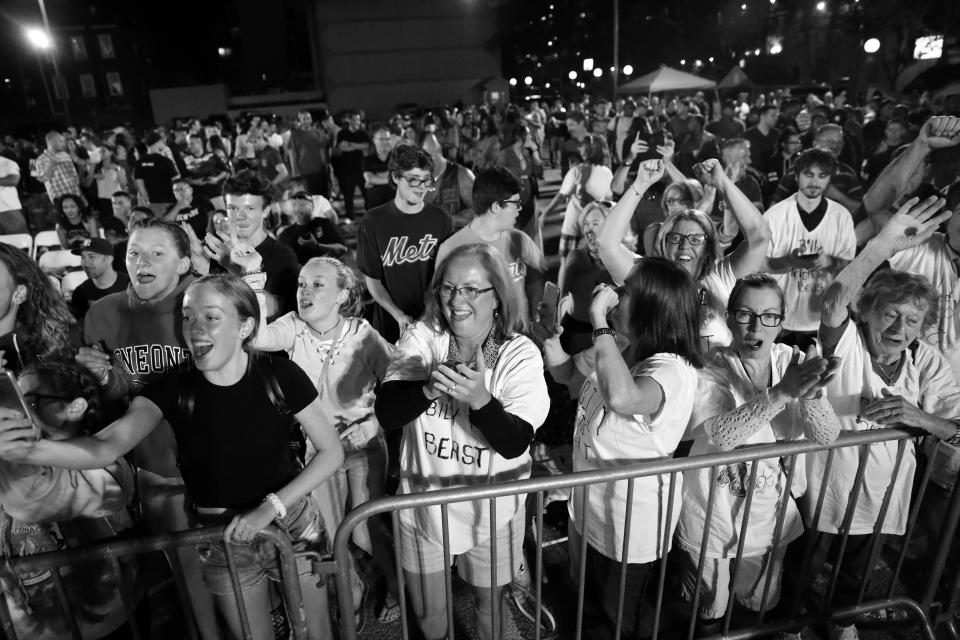
“Overtime stealer!” chanted a pack of women and girls in homemade T-shirts who appeared to be the wife, daughters and friends of Sgt. Billy Gatis, who went head-to-head with his fellow sergeant from the NYPD’s property clerk division, Russell Rodin.
Officers from the department’s 73rd Precinct in northeastern Brooklyn yelled “Seven-three! Seven-three!” as their coworkers Arkadiusz Taraska and Keith Stark brawled in the ring.
Female police officers served as round-card girls, strutting around the ring in tiny black shorts with NYPD printed in blue across the butt. Hip-hop and reggaeton at volumes that might earn a civilian a ticket for creating a public nuisance punctuated the three one-minute rounds that constituted each bout. The air was thick with the smell of cigars, as the increasingly rowdy crowd smoked and drank through the night. Judges from USA Boxing, the official national governing body for amatuer boxing, alternated their focus between keeping score during the fights and eating hot dogs from Nathan’s Famous.
“I tell you, the city’s gone all wrong [with] EEOO lawyers,” Tufano said, referring to the police department’s Office of Equal Employment Opportunity, which is officially tasked with mediating conflicts between department employees. “This is where you settle workplace disputes. In the ring.”
This is the philosophy behind NYPD smokers, boxing matches in which law enforcement officers from across New York City, including the Department of Corrections, transit and court officers, among others, are invited to challenge one another to settle personal disputes at evening exhibitions that also feature bouts between members of the department’s official boxing team, the NYPD’s Fighting Finest.
“Smokers have been going on since probably the beginning of time,” said Lt. Dave Siev, head coach of the Fighting Finest. “In the PD they always had smokers, where either grudges would get settled or people would just want to fight.”
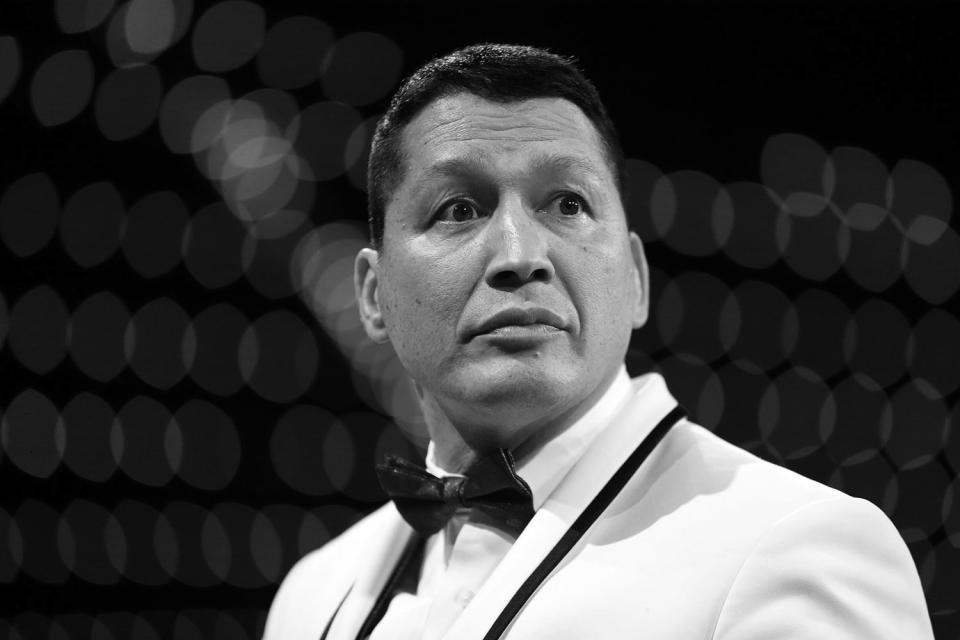
Siev, who began boxing as a kid at his local gym in southern Queens, first started organizing his own smokers back in 1996, about four years before he officially took over the boxing team. Now he holds about four a year in different boroughs. Other venues include a casino in Queens, an old fertilizer plant in the Bronx, which Siev swears “doesn’t smell anymore,” and the theater (not the main arena) at Madison Square Garden.
Ticket sales benefit the Atlas Cops & Kids Boxing Program, which was begun by Siev’s former partner Pat Russo in 1985. At their gyms in Staten Island and Brooklyn’s Flatbush Gardens, the Cops & Kids program combines tutoring, mentoring and boxing to teach teenagers discipline and foster positive relationships with police.
“Before I get off the job, which is three or four years from now, I want to have a Cops & Kids gym in every borough in New York City,” Siev told Yahoo News.
It’s going to take a lot of tickets to accomplish that goal, which is why Siev has decided to embrace the mass appeal of the grudge match.
“What people really like is drama, reality TV,” he said. “They like the regular guy next door.”
Social media has been a game changer for Siev, who uses Instagram and Facebook to generate excitement for upcoming fights by posting video interviews with the contenders, which he calls “Smoker Talk.”
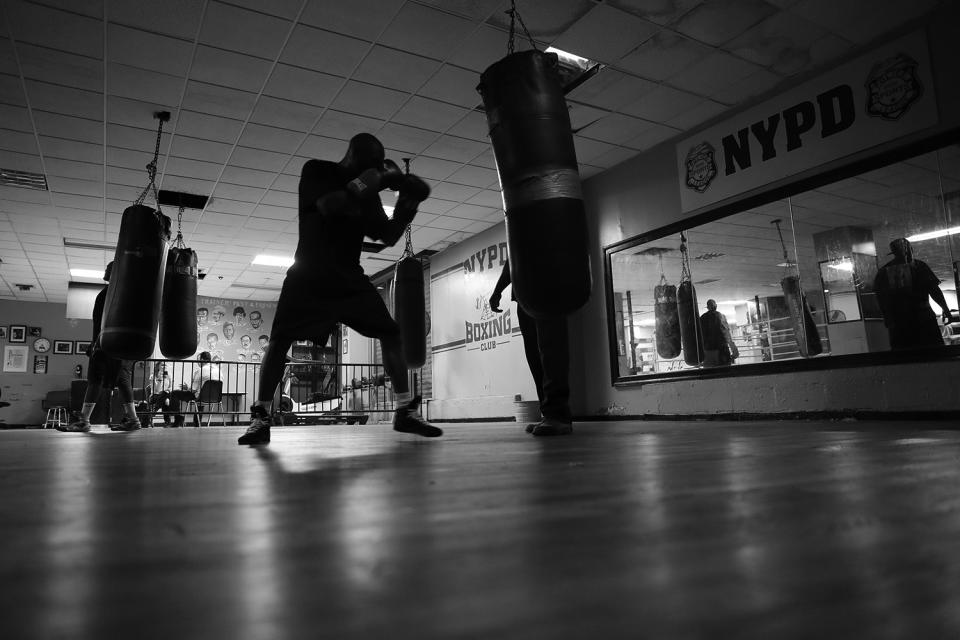
In a world filled with tough guys and big talkers, Siev has found the videos to be a particularly useful tool for pressuring officers to put their money where their mouths are.
“If you’re gonna fight, I have to make sure that you’re gonna show up,” he said. “If I interview you on Smoker Talk, you got a few thousand people that are looking at you. So now you can’t back out without looking like an utter coward, or an utter sham artist.”
Before social media, Siev said, the average smoker crowd was 300 to 800.
Nearly 4,000 showed up to watch a fight at Madison Square Garden in June.
Backstage at the Garden before the fight, officers traded barbs, laughing as they changed into their gym clothes. Others prepared quietly with their trainers.
In a dressing room of her own, Det. Katie Walsh of the 75th Precinct in Brooklyn anxiously adjusted her pigtail braids in a mirror lined with bright bulbs.
“I knew about the smokers, but I never thought I would even go to one, to be honest,” said Walsh, who had been challenged about six weeks earlier to a grudge match — the first between two female officers in smoker history.
“She has a vendetta against me, it seems like,” Walsh said of her opponent, Officer Stacy Weinstein of the 13th Precinct in Manhattan.
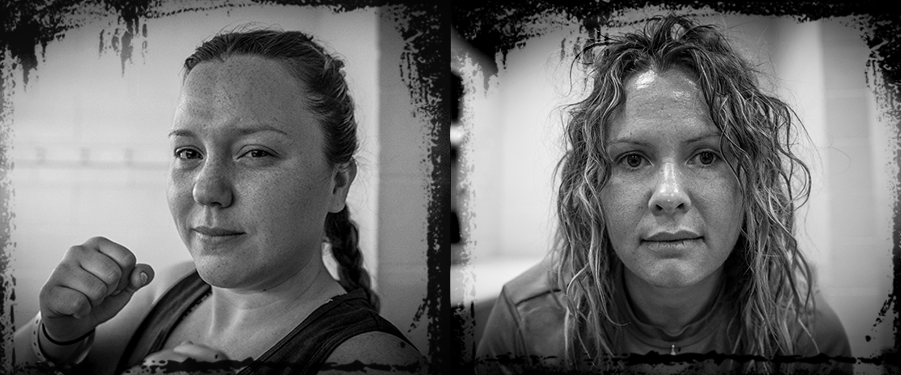
The two women previously worked together in NYPD’s transit bureau, but Walsh said they haven’t seen each other in at least four years. “I guess I didn’t rub her the right way when I was there,” Walsh told Yahoo News, giggling and shrugging her shoulders innocently.
Pressed, she admitted, “We got in, like, maybe one little incident that got us in trouble, but it wasn’t even that crazy for her to be thinking about it four years later.”
“We just got one of those little command disciplines together,” she said cautiously.
For Weinstein, the beef with Walsh was “pretty real. We had prior issues where, basically, I took the rap for something she did,” Weinstein told Yahoo News, declining to elaborate. “Thought maybe she would come forward and admit what she did. She didn’t, so here we are.”
Thanks to Siev’s Smoker Talk, the Katie vs. Stacy grudge match had emerged as the night’s main event — drawing many others who had never been to a fight before. Walsh said she alone sold at least 100 tickets. In the stands, family and friends showed their support with lime green T-shirts that read “Team Walsh” in white letters across the front.
“It’s not even about hating a person,” Weinstein insisted. “At this point it’s about charity, it’s about bringing females out. All around it’s like a win-win.”
The approach to women at these events is as old-school as the concept of grudge matches themselves. At the Coney Island smoker, there were two “female brawls,” both of which inarguably drew some of the most applause and excitement from the crowd. Ticket prices are $25 for men — and $15 for women.

A week after the Madison Square Garden fight, Siev said he hadn’t tabulated the total amount of money raised that night but estimated it was somewhere around $30,000.
Before the fighting began at Coney Island, Nicole Malliotakis, a Staten Island assemblywoman and Republican mayoral candidate, praised the Cops & Kids program and promised that there would be a gym in every borough if she is elected mayor.
Outside the law enforcement world, however, where images of police violence have become regular fixtures of the national news and social media, the idea of cops settling personal scores through public punching matches evokes a different reaction.
“I think it is absolutely outrageous. I think it’s appalling. I think it’s medieval,” said Ann McGinley, a law professor at the University of Nevada Las Vegas who specializes in legal issues surrounding masculinity, gender and employment discrimination.
McGinley questions the kind of message such events might send, not only to the public but throughout the force, about what it means to be a cop.
“What it says about being a policeman is [that it’s] about being a man,” she told Yahoo News. “It raises a certain type of violent masculinity to the identification of what a police officer should be, and I don’t think those particular qualities are qualities that necessarily make a good police officer.”
“I understand you have to be tough, but I don’t think it needs to be this kind of violent behavior,” McGinley continued, adding, “And I think we’d like to see a scaling down of violence by police in community or against one another.”
McGinley clarified that she’s “not against boxing in general, but in this context, as a way to resolve disputes in the workplace” — as distinguished from a sporting event in which athletic competition, not working out personal grudges, is the point.
“This is not normal behavior, and I don’t think the fact that you’re a police department makes it any different.”
Eugene O’Donnell, a former NYPD officer turned professor at John Jay College of Criminal Justice, agrees that smokers are “not something you would see in your typical workplace.”
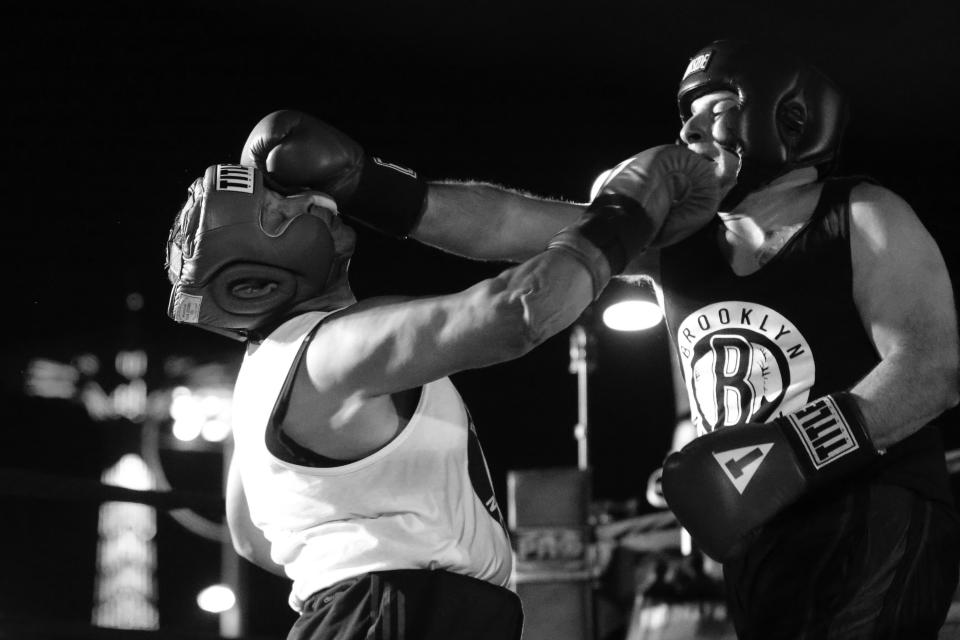
“It’s definitely a throwback,” O’Donnell told Yahoo News. “But the police and fire workplaces resemble the military in some ways, a workforce that, in part at least, believes conflict resolution … can be physical as well as verbal.”
However, he noted, “particular problems can arise when subordinates and supervisors trade blows. There can arguably be an unacceptable blurring of the chain of command.”
Increased scrutiny surrounding high-profile police killings over the past few years has led departments to emphasize approaches such as “community policing” and deescalation training for officers.
In McGinley’s view, the smokers seem to completely contradict this effort. After all, she asked, how can police officers be expected to resolve conflicts on the street without resorting to violence if they’re encouraged to do the exact opposite amongst themselves?
A spokesperson for the NYPD did not respond to requests for comment, but Commissioner James O’Neill did show his support for New York’s Fighting Finest with a tweet from last year’s smoker at Madison Square Garden.
Exciting evening @TheGarden last night watching NYPD Boxing Champs battle in the ring to benefit Childrens Charities pic.twitter.com/0g3UorQo2g
— Commissioner O’Neill (@NYPDONeill) June 10, 2016
Some of the more serious NYPD fighters offered a different perspective, suggesting that boxing might actually work as its own method of deescalation training.
“Boxing calmed me down a lot,” said Javier Colon, a corrections officer who has been actively involved with the NYPD boxing team for the past three years.
“I am not gonna lie, I was a talker or loudmouth, whatever,” he said. “I was very impatient. I learned how to be quiet. I learned how to shut the hell up.”
These days, Colon prefers to sit back and let other people talk, assessing situations and brainstorming solutions “instead of pointing out problems.” Now, he said, he’s “more of a ‘do’ guy.”
Asked why he thinks boxing has had such a calming effect on him, Colon responded by asking, “Have you ever been punched in the face?”

“When you get punched in the face a couple of times, it kind of humbles you,” he explained. “You gotta learn new techniques, learn how to be patient. You gotta understand that that man is gonna punch me in my face, but what should I do after that?”
Siev echoed Colon’s view, saying that boxing “is the great humbler for everybody.”
“Sometimes people get angry or people think, ‘Oh, I’ll punch this guy in the face,’” he said. “What happens in boxing is, when you punch somebody in the face, they punch you back in your face.”
That dynamic, Siev argues, creates a mutual respect between opponents, while forcing them to act quickly yet strategically.
“Quite frankly, police officers have to subdue perpetrators of crime sometimes, and really, you want to do that without hurting anybody,” he said. “So basically, the more you’re in shape and the better you can fight, the more easily you can handle something without violence.”
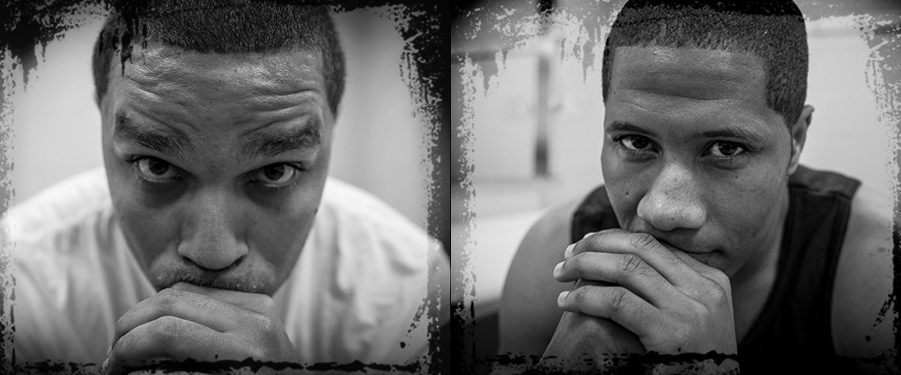
Officer Greg Thuesday, who has been boxing for about 10 years, agreed that the same principles that are necessary for boxing — staying calm and composed, not taking things personally — are helpful for interacting with people in his daily job as a neighborhood coordination officer at the 28th Precinct in Harlem.
At the same time, both Thuesday and Colon said that they’d never fought in a real grudge match — and probably never would.
“I don’t honestly even think I could step in the ring with somebody that I had a problem with,” Thuesday, 36, told Yahoo News. “For me, boxing, it’s a sport. And I can’t compete in a sport if I’m angry. I can’t compete if I got stuff on my mind. So if I’m angry at the person, even if I get a chance to punch him, it won’t be the same for me. I probably wouldn’t even be able to fight.”
“You have to be composed,” he added. “You have to think. Sometimes you may even have to talk to yourself. And if you’re seeing red, it’s not really gonna be a good fight.”
Though the overarching theme of the smokers is that all animosity gets left in the ring, some raise concerns about whether grudge matches between coworkers, partners, even subordinates and superiors could result in lingering tensions or resentments in the workplace even after a winner has been called.
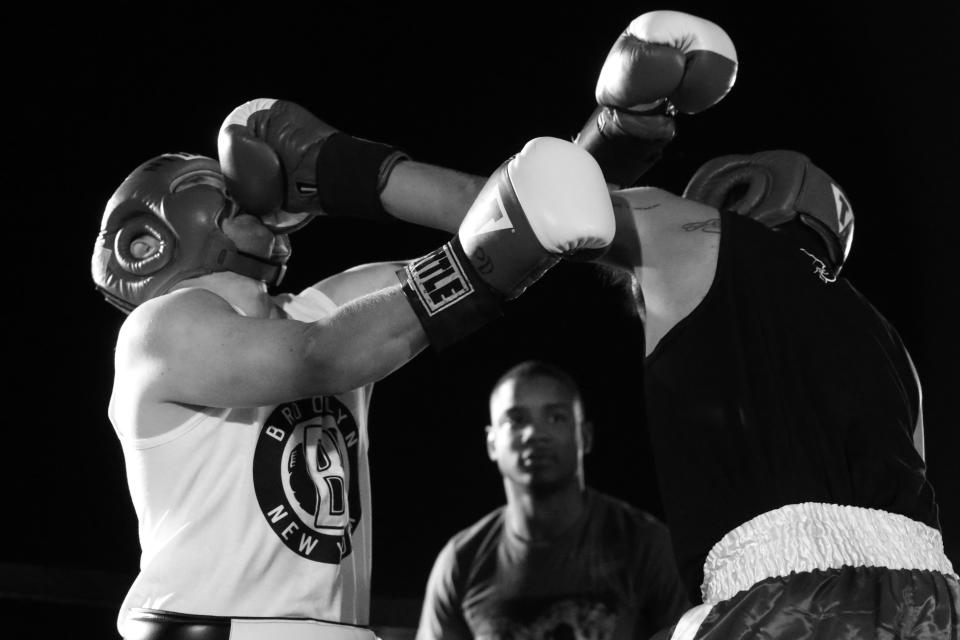
“It seems to me that it has to affect the environment in the police department,” McGinley said. “I know people say boys get it out on the playground and then it’s over with. I’m not convinced in this case, especially when you have people of different statuses, that it couldn’t lead to very serious problems between them.”
Without even knowing about the social media aspect of Smoker Talk, McGinley said the chances that one might “feel forced to engage” in a fight because of pressure within the precinct could be “really problematic.”
To avoid causing real problems at work, Siev said, “I have them go to their union delegates and stuff” before engaging in a grudge match. He also tries to make sure “it’s always a personal thing, it’s never business.”
Still, Siev does not deny that some of the grudges are very real. “There’s levels to this game,” he said. “Some people really hate each other.”
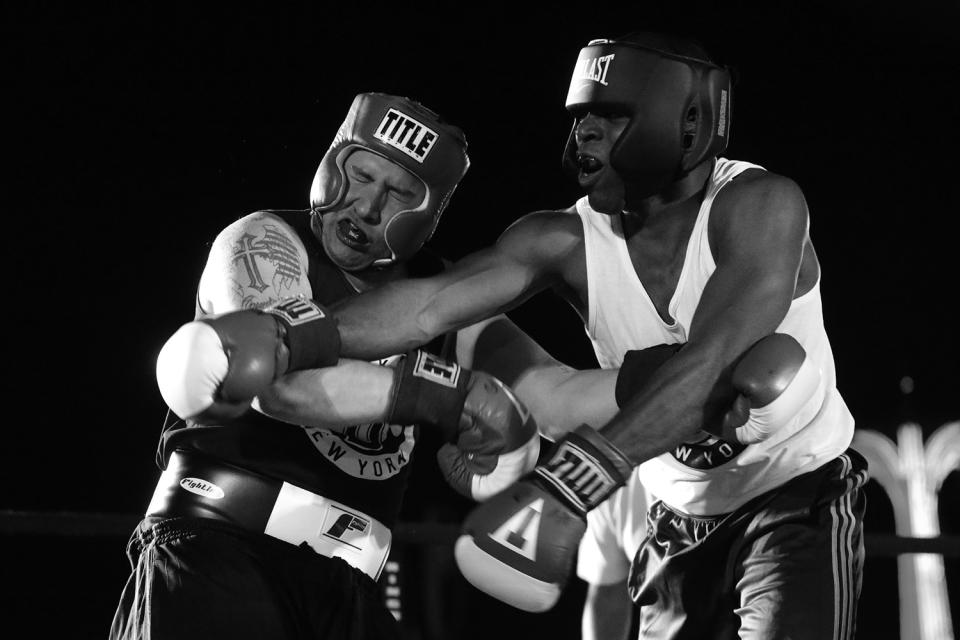
“If you think there’s something that your boss is doing wrong at work, we don’t care. That’s not a smoker,” he said. “Now, if your boss and you really don’t like each other for whatever personal reasons you have, you really don’t like the way he speaks to you, you feel a little disrespected, you feel slighted or you just have a personality conflict, by all means come see us.”
In the end, whether it was sincere or not, all the grudge matches ended with both fighters agreeing to put their differences aside — except for Weinstein, who told Tufano that all was not, in fact, good after the judges declared Walsh the winner.
“This female thing’s a new twist,” Siev said. Still, he insisted that even though rematches do happen every once in a while, they’re usually motivated not by anger but rather by a desire for self-improvement.
“They’re not challenging the other person because they have a problem with the other person. They have a problem with themselves, and they feel like, ‘I could do better than that,’” he said. “Boxing is you’re really challenging yourself. You have obstacles to face and to overcome, and that’s what it is.”
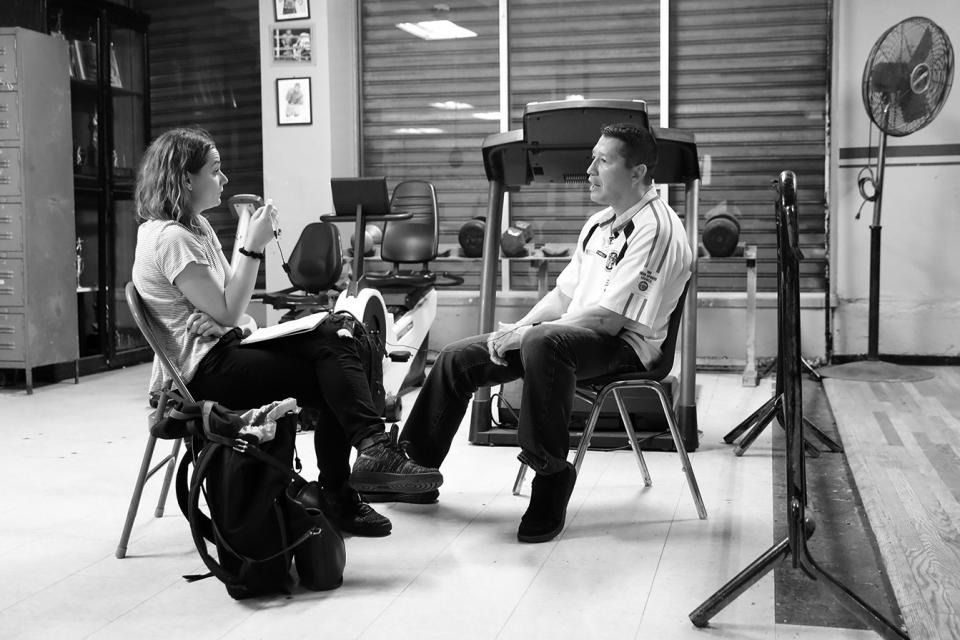
Read more from Yahoo News:
Arizona’s Jeff Flake fights for conservatism’s future, and his own
Texans step up to rescue neighbors as Harvey hammers Houston
Trump defends Arpaio pardon by trashing Clinton, Obama clemencies
Photos: NYPD settles disputes in the boxing ring in the ‘Brooklyn Smoker’
Photos: NYPD boxing championships at the Theater at Madison Square Garden




